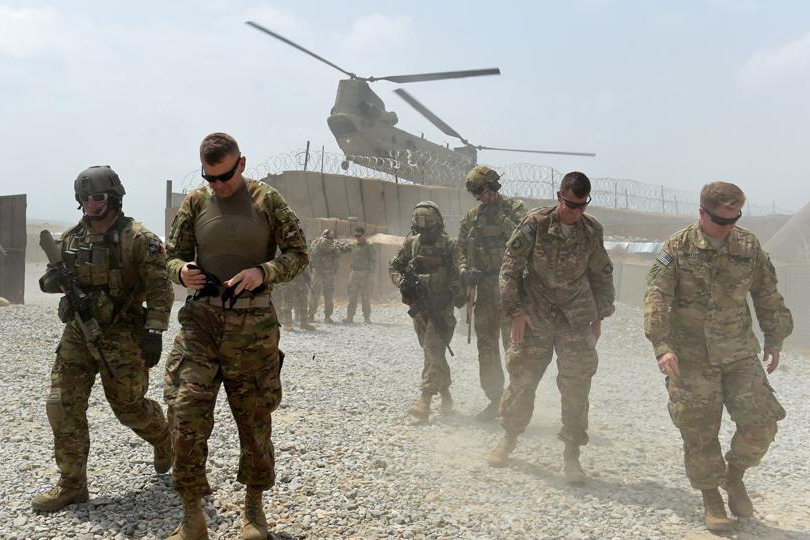John Glaser
A new joint resolution introduced in the Senate calls on the executive branch to withdraw all U.S. troops from Afghanistan within one year. President Trump has already expressed a desire to draw down, and with negotiations with the Taliban showing promising signs, it seems America’s longest war is coming to an end.
However, politics always lag substantially behind reality. While polls show public support for withdrawal, much of Washington opposes bringing the war to a close. Policymakers must face some hard truths on Afghanistan.
1. We lost.
The core of our nation-building mission in Afghanistan has failed. We have not been able to pacify the Taliban insurgency, nor have we created a viable democratic government that can maintain order without external support. The Taliban now hold more territory, about half the country’s districts, than at any point since 2001. Last year marked the highest recorded number of civilian deaths since 2009.
A recent Inspector General report found that the strength of the Afghanistan security forces is at its lowest point since 2015, as it suffers from desertions, depressed morale and low re-enlistment. An astounding 45,000 Afghan police officers and soldiers have died since 2014.
We have tried everything: light footprint, heavy footprint, troop surges, regional cooperation, increased aid. Nothing has brought us closer to our objectives. The Taliban will fight in perpetuity until a full U.S. withdrawal and until they regain political power in Kabul.
Americans don’t like to hear that they have lost a war. During Vietnam, officials in Washington had acknowledged privately as early as 1965 that most of the reason for keeping the war going was not to achieve our objectives, which were basically lost, but to avoid the humiliation of defeat. But extending that horrible war for years on this basis was wrong. It’s time to simply face the hard truth: We lost. Now, let’s cut our losses and leave.
2. The ‘terrorist safe haven’ is a myth.
The security rationale for continuing to fight this lost war is to prevent a Taliban-controlled Afghanistan from being a sanctuary for terrorist groups. But Al Qaeda’s presence Afghanistan in the lead-up to 9/11 did not have real operational utility in enabling the terrorist group to perpetrate the attacks on New York and Washington. The attacks were also planned from Germany and Malaysia, and even the United States itself. In an age of instant global communications, a territorial haven in remote, land-locked Afghanistan isn’t much help to terrorist groups plotting to attack the west.
In any case, terrorism is not some kind of existential peril warranting perpetual war. It is a relatively minor and manageable threat. One estimate, employing standard risk analysis, found that in order to even begin to justify the $75 billion in annual anti-terrorism homeland security expenditures, there would have to have been about three 9/11 attacks every four years.
The war in Afghanistan has cost about $2 trillion on top of that. Most people who attempt to commit terrorist attacks here in the United States are home-grown and there is no evidence — none — that battling insurgents there has deterred terrorist attacks here. Clearly, the resources we spend on the war exceed any plausible benefit to national security.
This hard truth has an upside. In negotiations with the U.S., the Taliban have agreed in principle to not allow Al Qaeda a presence in Afghanistan in the future. This has been their de facto position for a long time, but if the Trump administration is looking for a face-saving way out of a lost war, they should take advantage of this “concession” and get out.
3. Things will get messy post-withdrawal.
This may be the hardest truth of all: Don’t expect kumbaya after we leave. There may be infighting, increased militant activity, or even a low-level civil war. You might even see regional actors begin to throw their weight around a bit more. But Americans should keep in mind that U.S. security is largely insulated from the effects of these contingencies.
The United States cannot control the post-withdrawal governance of Afghanistan, and that will mean coming to grips with Taliban rule. The prospects for democracy, human rights, and protection of women, among other things, will take a hit. That’s just the reality.
But Afghanistan is not a very free and liberal place even with an indefinite U.S. military presence. The Kabul regime is certainly better than Taliban rule, but by no means is it a shining success: It ranks low on democracy, political rights and civil liberties, while ranking one of the highest in the world on corruption.
Watching democracy roll back in Afghanistan will be difficult, but it should serve as a reminder that the nation-building mission we elected to adopt after the fall of the Taliban in 2001 was a lost bet from the beginning. We’ve been at it for nearly 18 years, at great cost, and it has failed.
Policymakers must learn the limits of U.S. power and refrain from adopting ambitious missions for peripheral interests. Refusing to fight unwinnable and unnecessary wars is the first step to not losing them.







Comments